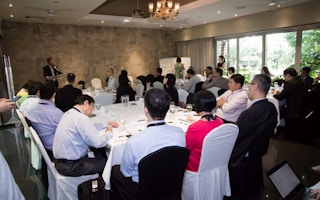There is a close relationship between a sustainable society, a prosperous economy and a smart nation; if Singapore can achieve all three goals, it can help address some of the world’s biggest existential challenges.
Speaking at the inaugural Smarter Cities Roundtable last Tuesday, Dr Vivian Balakrishnan, Minister for the Environment and Water Resources said that Singapore’s experience in balancing the economy, environment, and technology adoption could help address global challenges such as climate change, painful economic restructuring, and strengthening social cohesion.
“A sustainable environment, a dynamic economy and a Smart Nation are really three dimensions of a tightly interconnected nexus,” he noted.
Late last year, Singapore’s Prime Minister Lee Hsien Loong set out a vision for the country to become a leading smart nation to harness technology to raise the quality of life for citizens and create new business opportunities.
Around the same time, he launched the Sustainable Singapore Blueprint (SSB), a $1.5 billion effort to make Singapore an eco-friendly city with a ‘zero-waste’ culture and a flourishing green economy by 2030.
Balakrishnan, who is also Minister-in-Charge of the Smart Nation initiative, noted that smart technology will be key to achieving the objectives of the sustainability blueprint, which focuses on five areas: eco-friendly and smart towns, a car-lite culture, a zero-waste nation, a leading green economy, and an active and gracious community.
Some technologies driving Singapore’s smart nation vision include an islandwide network of over 1,000 sensors to monitor the flows of people and information, software capable of analysing huge volumes of data, ubiquitous internet connectivity, innovative mobile applications, among other things.
At the discussion, organised by Swiss power and automation giant ABB and Eco-Business, about 40 senior public, private sector, and civil society participants recommended three ways that Singapore can realise its goals.
These were: government leadership in making the right decisions even if market economics do not support them yet; creating a conducive regulatory environment that allows innovative, entrepreneurial businesses to flourish; and putting in place public and private sector initiatives to enable the local workforce to gain the right skills for the digital age.
One example of how the government had prioritised people’s welfare over economic gains was a decision taken by Singapore’s first Prime Minister Lee Kuan Yew in the early years after gaining independence to power the country with natural gas rather than cheaper but dirtier coal-fired plants, shared Balakrishnan .
This was because Lee “instinctively understood the value of clean blue skies” for Singapore, he told the participants gathered at The Halia at Singapore Botanic Gardens.
Johan de Villiers, managing director of ABB in Singapore and Southeast Asia, added that The Netherlands made a similar decision when they invested heavily in fast-charging infrastructure for electric vehicles in 2013. This decision was not driven by economic factors, but it was what the people wanted, he explained.
“Some things you leave to the market, and in other cases, you decide to the do the right thing,” he noted.
Policies to ease technology adoption
“
Singapore is well placed not only in the region, but the world, to pioneer what is possible. Developing solutions for smart and sustainable cities will need the exchange of different views, and people to have a brave and pioneering spirit.
Johan de Villiers, managing director, ABB Singapore and Southeast Asia
Participants agreed that since SIngapore will need new solutions to drive efficiency and productivity, it is important for policies and regulations to support companies wanting to explore innovative technologies or business models.
Eugene Seah, city executive director of property consultancy ARCADIS, recounted an incident when his firm was involved in a project whereby the Main Contractor found it difficult to secure internet connectivity at a construction site, where designers and constructors needed the high speed connection to run sophisticated Building Information Modelling software that improves the efficiency of the building process.
Here, closer collaboration between agencies and companies could have paved the way for better technology adoption, increasing effectiveness and efficiency in the industry, he said.
Government support, in the form of grants or tax rebates, could also encourage businesses to invest in developing new technologies, said participants.
While Singapore’s government does not favour widespread subsidies for adoption of sustainable technologies such as solar energy, “if we can help with targeted plans or incentives to reduce hurdles, we will help you do it,” Balakrishnan said.
Manpower and education
Singapore’s push towards balancing its sustainability goals with becoming a global leader in technology, will also require access to individuals with skills in areas such as engineering and computer science, said participants.
But, as Lili Kuan, Barclays country head and chief operating officer pointed out, home-grown talent in these areas is relatively scarce. Addressing this challenge requires upgrading the skills of the existing workforce, and making these technical disciplines as attractive to students as highly-coveted subjects like law, medicine, and finance.
National University of Singapore (NUS) professor Michael Quah also emphasised the need for sustainability to be interwoven in these technical subjects.
Dr Malone-Lee Lai Choo, director of the NUS Centre for Sustainable Asian Cities, stressed that in order for a smart city to be liveable and vibrant, there must also be opportunities for creative professions such as artists, musicians, and poets to flourish.
“A smart city is about talent and technology, but it is also about tolerance and diversity of opportunity,” she said.
Eco-Business editor Jessica Cheam, who moderated the roundtable dialogue, agreed, adding that “technology is only an enabler and a means to an end”.
Ultimately, the purpose of technology is to improve the life of citizens, and all ‘smart’ initiatives should be guided by the need to be efficient, sustainable, and about people, she noted.
ABB’s de Villiers observed that Singapore is “well placed not only in the region, but the world, to pioneer what is possible”.
“Developing solutions for smart and sustainable cities will need the exchange of different views, and people to have a brave and pioneering spirit,” he said.

















